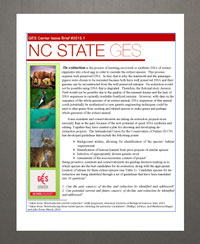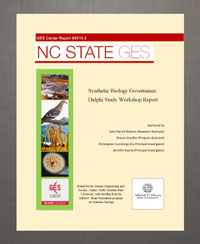Updates
Forthcoming
- Cyberplasm
- Biomining
- Plant Microbes
Our SynBio E-cases are now available for viewing.
Goals & Objectives
The overarching goal of the project is to “unpack” the broad field of synthetic biology (syn bio) for more nuanced and productive policy discussions in order to help set priorities to risk-relevant data collection, organizational and/or legislative readiness for oversight and public and stakeholder engagement. To this end, the project team will develop 3 case studies of syn bio applications that are in early stages of development in order to critically evaluate the potential risks, benefits and societal issues posed by them, and to identify the strengths and weaknesses of existing systems likely to be used for their governance. A particular focus will be on convergent syn bio products (e.g. nano-bio or bio-robotics) with agricultural, environmental and industrial uses, as these areas of syn bio are currently under-studied.
Upstream oversight assessment (UOA) (Kuzma, et al. 2008) will be used as the primary method of analysis. UOA is designed not necessarily to predict, but rather to prepare for governance of emerging technologies well upstream of technological deployment. It relies on stratified selection of case studies from research and development databases to cover a range of product-types and sector, and the subsequent analysis of cases. The syn bio typology developed by Kuzma & Tanji (2010) will be used to guide selection of a diverse set of cases.
Specific research questions will include:
- What are the potential impacts on health and the environment associated with the syn bio application?
- What are the types of data and information needed to assess the risks and benefits?
- What are the associated uncertainties and how might they affect oversight?
- How can risk analysis methods be used in the face of such uncertainties?
- How might existing statutes and organizations be involved in oversight?
- Is there a non-syn bio analog of the product already on the market?
- If so, does the syn bio application warrant new or modified oversight approaches?
- If so, how should oversight change?
- What might be the broader societal issues surrounding oversight and how the research, policy or engagement needs to be addressed?
Activities and Products
Qualitative research is being done by graduate students and project staff to develop the draft case studies. The team is drawing upon published literature, experiences with historical analogues and interviews with the developers of the selected syn bio applications. Expert-stakeholder input on the draft cases will then choose four case studies to further research. A policy Delphi-process will be applied to those case studies, and expert-stakeholders from those areas will be used to explore attitudes towards the futures of biomining, cyberplasm, d-extinction and engineered plant microorganisms to identify and evaluate options for risk analysis and governance. The Delphi-process includes phone interviews, an online survey, a workshop and an additional online survey.
We expect at least two peer-reviewed journal publications from the research: one describing the qualitative analysis of the the four cases and the other examining expert-stakeholder attitudes towards their governance through the Delphi exercise. In addition to the two scholarly publications, we will develop the case studies, we develop the case studies into more accessible “e-cases” targeted to a lay audience. We will do this with the help of the Hubert Project at University of Minnesota. The syn bio e-cases could be used in the future for catalyzing broader societal dialogues about syn bio governance.
Expected Outcomes
Discussions about synthetic biology governance seem to have been stalled due to a lack of specificity. We expect that the cases will spark more productive dialogue to prepare for a a future with syn bio products and applications. the cases will help to facilitate policy making in the event that there is political impetus to do so. We also expect better understanding by the public at large of syn bio from the dissemination of the electronic cases.
Grant Personnel
Dr. Jennifer Kuzma
Center Co-Director and Co-PI of the Syn Bio Sloan Foundation Grant
Public & International Affairs
Professor
Email: jkuzma@ncsu.edu
Dr. Christopher Cummings
Co – PI of Syn Bio Sloan Foundation Grant
Assistant Professor
Division of Communication Research
Wee Kim Wee School of Communication and Information
College of Humanities, Arts, & Social Sciences
Email: CCUMMINGS@ntu.edu.sg
Sharon Stauffer
Center Program Assistant
Email: sastauff@ncsu.edu
Sheron Nicole King
Public & International Affairs
Graduate Teaching Asst
Christina Ndoh
Public Administration
Graduate Student

